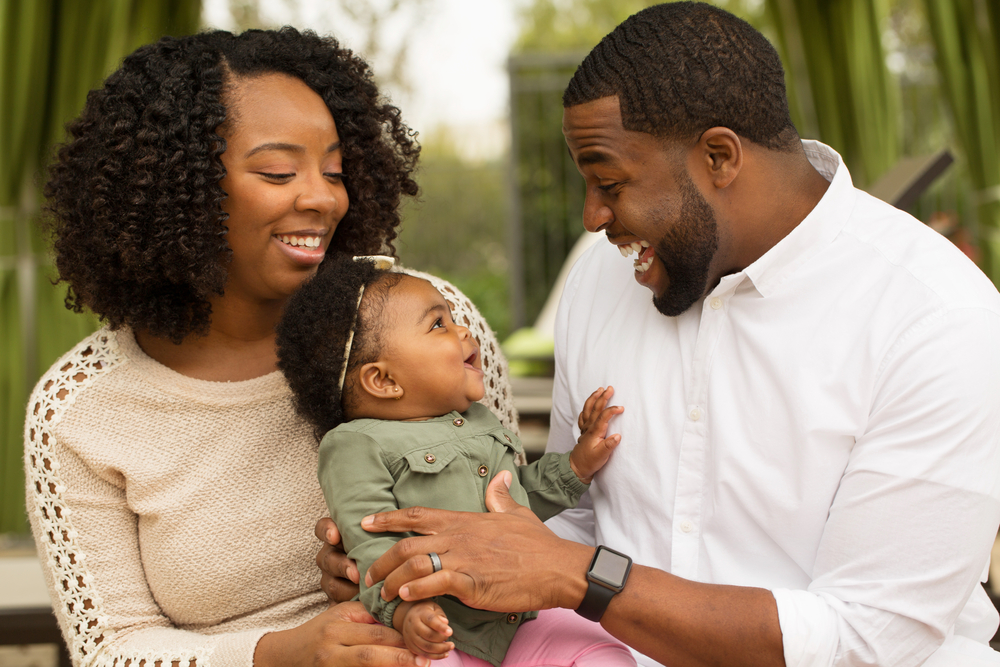A Parent’s Guide to your Child’s First Words
Updated August 29th, 2023

As with all stages of child development, there is a range during which children develop their skills. So if your child is not doing everything at every stage, it is not necessarily cause for concern. However, a wait and see approach is not necessarily the best either, especially when early intervention can make a difference.
Lisa Fehr, a speech-language pathologist with the Winnipeg Regional Health Authority, often tells parents that a child’s language development can be compared to climbing a set of stairs, with a child at the bottom, and moving up one step at a time.
Babies start reacting to sound right at birth. At around four to six months, they will start cooing or “talking,” followed by babbling at around six to 12 months. You will usually hear your baby’s first words at around 12 to 18 months.
As your child continues up the steps, you should be seeing him or her using around 50 single words by 18 to 24 months. By 24 months, children start to use some two-word phrases, such as “Ahdah mama” (“Alldone mama”) or “Wawa peas” (“Water please”).
The words and sounds of a two-year-old are not necessarily spoken clearly, but that is normal. From two to three years of age, you should be seeing a rapid change in speech and language development, with an increasing vocabulary and use of language. At this stage, you should be wondering, ‘Where did our child even learn certain words?’
By three years of age, you should understand your child’s speech 75 per cent of the time, and they should be telling you short stories, and using three- and four-word phrases (“Me goed to the pawk (park)”, “Her is awdone (alldone) now”). Their speech may not be completely perfect yet, but that is still okay.
From four to five years of age, children are gaining more and more words, ideas and concepts, and should be able to express themselves with longer and longer sentences and in a smooth, clear way. They should understand your questions and directions and their speech should be understood almost all the time by an unfamiliar listener. That is a lot of stairs, in a short time.
Here are a few tips to help your child’s speech and language development:
1) Limit screen time according to the Canadian Pediatric Society’s recommendations. That means no screen time (TV/tablet/phone) for children up to two years of age and limited screen time (less than one hour per day) for children between two to five years of age.
- We don’t talk much when we look at a screen and the same goes for your child. This is a tough one in this day and age, but children learn how to communicate through active play and engagement with the people and things in their world.
2) Provide lots of verbal input to your child. Talk to them all the time about what you’re doing, what they’re doing, what you’re seeing, hearing, and where you’re going. Talk throughout your day. Talk to them in the language you are most comfortable. When you talk to your child, wait for them to do or say something in response. Mealtime, bath time, playtime, driving, walking, shopping are all opportunities for your child to learn words.
3) Use books right from birth with your child. Use them to snuggle up and enjoy some time together. Aim to read at least one book every day. Use the library. Don’t feel you have to read the entire book. Look at the pictures and name the items on the page. Even if your child is only interested in one page, that is still a great start and a great way to learn words and ideas.
The stories and books you share in the early years shape your child’s:
- understanding of the world,
- sense of humour, compassion, and interests.
Sharing your own traditional stories, songs and poems in your home language helps your children understand your culture and family values. Mybaby.ca has videos on reading books to your children click here to learn more.
Hot parent tip: If at any point your child’s speech and language seems to be “stuck” on a stair, or moves down a stair (regresses), or you have concerns, it is likely time to talk to a professional.
- The WRHA sees pre-school children for speech-language pathology services at various ACCESS Centres located throughout Winnipeg. These services can be accessed by talking to your health-care provider or contacting Children’s Therapy Initiative at 204-258-6550. We look forward to working with you and your child to help them take the next “step.”
Lisa Fehr is a speech-language pathologist/clinical service leader with the Winnipeg Regional Health Authority’s ACCESS Downtown. This column was originally published in the Winnipeg Free Press on Friday, December 4, 2018.